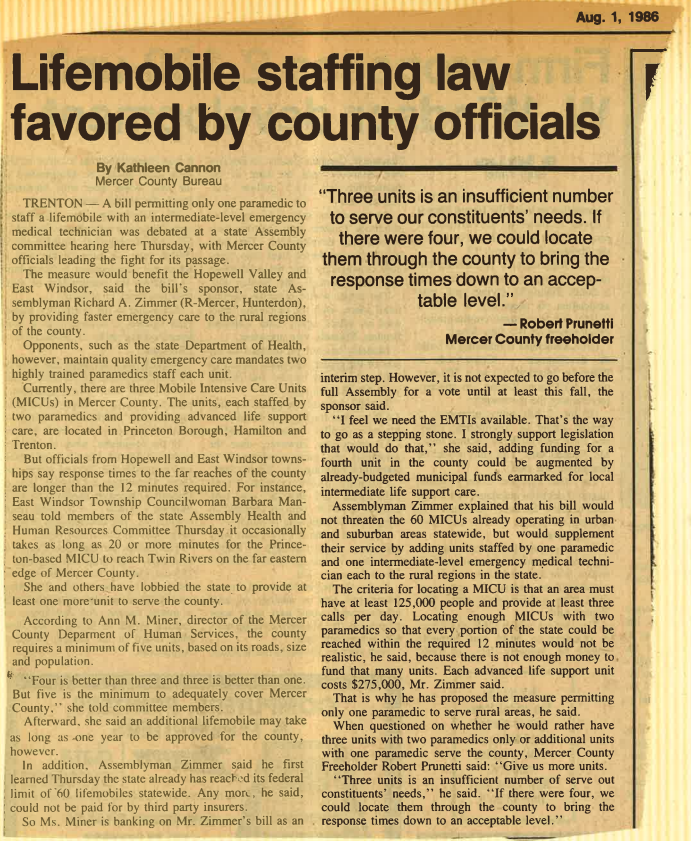
1 August, 1986
Lifemobile staffing law favored by county officials
By Kathleen Cannon
Mercer County Bureau
TRENTON — A bill permitting only one paramedic to staff a lifemobile with an intermediate-level emergency medical technician was debated at a state Assembly committee hearing here Thursday, with Mercer County officials leading the fight for its passage.
The measure would benefit the Hopewell Valley and East Windsor, said the bill’s sponsor, state Assemblyman Richard A. Zimmer (R-Mercer, Hunterdon), by providing faster emergency care to the rural regions of the county.
Opponents, such as the state Department of Health, however, maintain quality emergency care mandates two highly trained paramedics staff each unit.
Currently, there are three Mobile Intensive Care Units (MICUs) in Mercer County. The units, each staffed by two paramedics and providing advanced life support care, are located in Princeton Borough, Hamilton and Trenton.
But officials from Hopewell and East Windsor towns-hips say response times to the far reaches of the county are longer than the 12 minutes required. For instance, East Windsor Township Councilwoman Barbara Manseau told members of the state Assembly Health and Human Resources Committee Thursday it occasionally takes as long as 20 or more minutes for the Princeton-based MICU to reach Twin Rivers on the far eastern edge of Mercer County.
She and others have lobbied the state to provide at least one more unit to serve the county.
According to Ann M. Miner, director of the Mercer County Department of Human Services, the county requires a minimum of five units, based on its roads, size and population.
“Four is better than three and three is better than one. But five is the minimum to adequately cover Mercer County,” she told committee members. Afterward, she said an additional lifemobile may take as long as -one year to be approved for the county, however.
In addition, Assemblyman Zimmer said he first learned Thursday the state already has reached its federal limit of -60 lifemobiles statewide. Any mon., he said, could not be paid for by third party insurers. So Ms. Miner is banking on Mr. Zimmer’s bill as an interim step. However, it is not expected to go before the full Assembly for a vote until at least this fall, the sponsor said.
“I feel we need the EMTIs available. That’s the way to go as a stepping stone. I strongly support legislation that would do that,” she said, adding funding for a fourth unit in the county could be augmented by already-budgeted municipal funds earmarked for local intermediate life support care.
Assemblyman Zimmer explained that his bill would not threaten the 60 MICUs already operating in urban and suburban areas statewide, but would supplement their service by adding units staffed by one paramedic and one intermediate-level emergency medical technician each to the rural regions in the state.
The criteria for locating a MICU is that an area must have at least 125,000 people and provide at least three calls per day. Locating enough MICUs with two paramedics so that every portion of the state could be reached within the required 12 minutes would not be realistic, he said, because there is not enough money to fund that many units. Each advanced life support unit costs $275,000, Mr. Zimmer said.
That is why he has proposed the measure permitting only one paramedic to serve rural areas, he said.
When questioned on whether he would rather have three units with two paramedics only or additional units with one paramedic serve the county, Mercer County Freeholder Robert Prunetti said: “Give us more units.
“Three units is an insufficient number of serve out constituents’ needs,” he said. “If there were four, we could locate them through the county to bring the response times down to an acceptable level.”